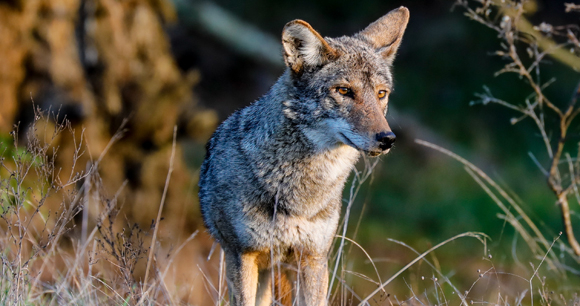
Washington, DC—The Oregon Fish and Wildlife Commission voted unanimously Friday to adopt a rule prohibiting wildlife killing contests for coyotes and other species classified as unprotected mammals in the state.
Wildlife killing contests are organized events in which participants kill animals within a certain timeframe for cash and prizes, which are awarded based on the number, weight, or size of animals killed. Principles of fair chase are frequently disregarded during such events, with participants using bait and electronic calling devices to attract animals with sounds that mimic prey or distress calls of wounded young, and the carcasses of the animals are usually dumped afterwards.
“Wildlife killing contests can result in hundreds of animals being wiped off a landscape in a single weekend,” said Johanna Hamburger, director and senior attorney for the terrestrial wildlife program at the Animal Welfare Institute (AWI). “This ban is a victory for humane, science-based management of wildlife populations.”
Oregon is now the ninth state to end these gruesome competitions, following California, Vermont, New Mexico, Arizona, Massachusetts, Colorado, Washington, and Maryland. Legislation in New York is pending, awaiting the governor’s signature.
A coalition of 22 local and national wildlife and conservation organizations—including AWI—as well as hunters, wildlife management professionals, scientists, veterinarians, and advocates across Oregon submitted testimony in support of the rule prohibiting these contests.
“Wildlife killing contests are abhorred by the Oregon public and have no place in our state,” said Kelly Peterson, Oregon state director for the Humane Society of the United States. “Engaging in wanton waste of a native wildlife species as part of a contest for prizes is abhorrent and we are grateful that the Oregon Fish and Wildlife Commission voted to end these cruel, gruesome competitions.”
Wildlife killing contests are destructive to healthy ecosystems, within which all wildlife species play a crucial role. Coyotes increase the biological diversity of plant and wildlife communities, disperse seeds, protect ground‐nesting birds from smaller carnivores, and help control disease transmission by keeping rodent populations in check, consuming carrion, and removing sick animals from the gene pool.
Moreover, killing contests do not reduce livestock conflicts, and may increase them. Nonlethal, preventive measures, such as fencing, guardian dogs, and scare devices, are the most effective solutions to minimize conflicts.
Organizations that supported the proposed rule include the Humane Society of the United States, the Animal Legal Defense Fund, the Bitterbrush Broads & Bros Leadership Team, Cascadia Wildlands, the Center for Biological Diversity, Central Oregon LandWatch, the Endangered Species Coalition, Great Old Broads for Wilderness, the Humane Society Veterinary Medical Association, Humane Voters Oregon, Lark Ranch Rescue and Rehabilitation, the National Wolfwatcher Coalition, Northeast Oregon Ecosystems, Oregon Humane Society, Oregon Wild, Portland Audubon, Predator Defense, Project Coyote, Think Wild, the Western Environmental Law Center, Western Watersheds Project, and the Humane Society Wildlife Land Trust.
Many of these allies belong to the National Coalition to End Wildlife Killing Contests, which was founded in 2018 with the aim of banning wildlife killing contests nationwide. AWI is a member of the coalition’s steering committee.
AWI is thankful to the members of the commission, to our partners at the Humane Society of the United States and other coalition members, and to our hundreds of advocates in Oregon who wrote letters in support of the proposed rule.
Marjorie Fishman, Animal Welfare Institute
[email protected], (202) 446-2128
The Animal Welfare Institute (awionline.org) is a nonprofit charitable organization founded in 1951 and dedicated to reducing animal suffering caused by people. AWI engages policymakers, scientists, industry, and the public to achieve better treatment of animals everywhere—in the laboratory, on the farm, in commerce, at home, and in the wild. Follow us on Facebook, Twitter, and Instagram for updates and other important animal protection news.